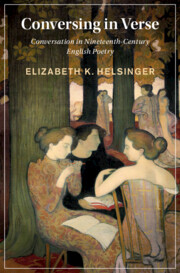Book contents
- Conversing in Verse
- Cambridge Studies in Nineteenth-Century Literature and Culture
- Conversing in Verse
- Copyright page
- Contents
- Figures
- Acknowledgments
- Chapter 1 Introduction: A Poetics of Encounter
- Chapter 2 Dialogue and the Idyll: Tennyson and Landor
- Chapter 3 Performing Conversation: Swinburne and Robert Browning
- Chapter 4 Projects of Animation: Coleridge and Clare
- Chapter 5 Ecphrastic Questions: Dante Gabriel Rossetti and Michael Field
- Chapter 6 Cruel Intimacies: Christina Rossetti and Thomas Hardy
- Epilogue
- Notes
- Bibliography
- Index
- Cambridge Studies in Nineteenth-Century Literature and Culture
Chapter 5 - Ecphrastic Questions: Dante Gabriel Rossetti and Michael Field
Published online by Cambridge University Press: 21 July 2022
- Conversing in Verse
- Cambridge Studies in Nineteenth-Century Literature and Culture
- Conversing in Verse
- Copyright page
- Contents
- Figures
- Acknowledgments
- Chapter 1 Introduction: A Poetics of Encounter
- Chapter 2 Dialogue and the Idyll: Tennyson and Landor
- Chapter 3 Performing Conversation: Swinburne and Robert Browning
- Chapter 4 Projects of Animation: Coleridge and Clare
- Chapter 5 Ecphrastic Questions: Dante Gabriel Rossetti and Michael Field
- Chapter 6 Cruel Intimacies: Christina Rossetti and Thomas Hardy
- Epilogue
- Notes
- Bibliography
- Index
- Cambridge Studies in Nineteenth-Century Literature and Culture
Summary
Chapter 5 considers ecphrasis less as an anxious competition between visual and verbal arts than as another form of sociable relations between persons and things. The chapter looks especially at collections by Dante Gabriel Rossetti (“Sonnets for Picture”) and the two women poet-lovers who wrote together as Michael Field, Katherine Bradley and Edith Cooper (Sight and Song). Following the example of Keats, these poets used grammatical questions (whose ecphrastic uses go back to classical epigrams and idylls) to structure their encounters with works of visual art. Embodying vision in both conversational syntax and poetic (and sometimes typographic) form served their larger efforts to restructure social and sexual relations in the politically charged moment of 1848 (for Rossetti) and at the end of the century (for Michael Field). They sought to draw works of art out of commodity relations and into something that looked like conversation, repersonalizing and reimagining the forms of sociability in which objects and persons might participate.
Keywords
- Type
- Chapter
- Information
- Conversing in VerseConversation in Nineteenth-Century English Poetry, pp. 110 - 135Publisher: Cambridge University PressPrint publication year: 2022



